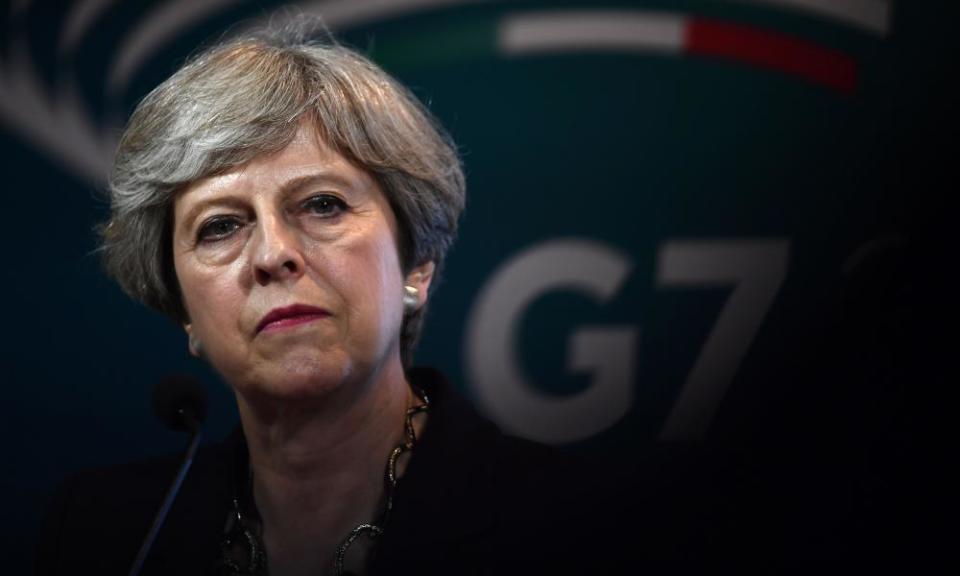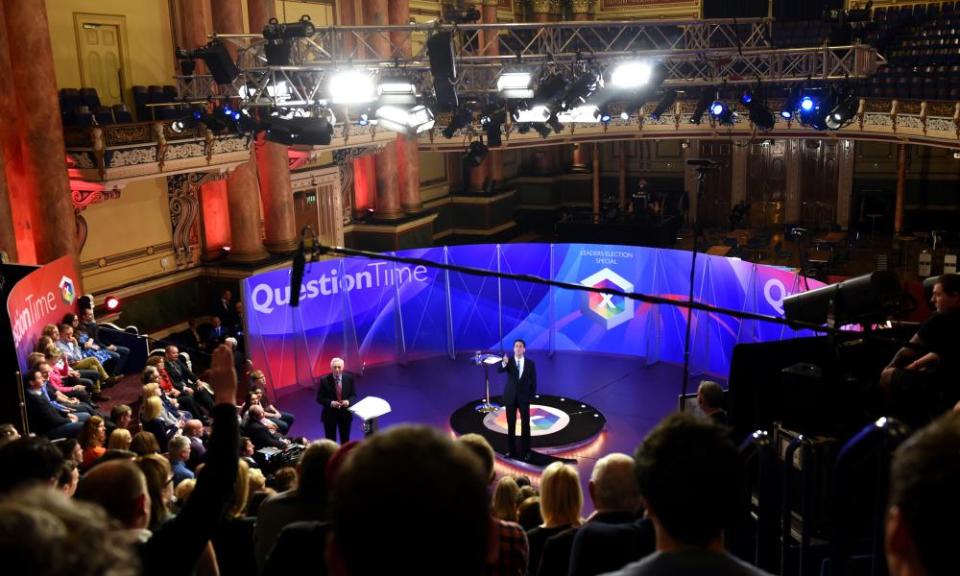Will primetime TV showdowns be a big risk for May?

On Monday at 8.30pm, the 2017 general election will come to life in millions of homes. May v Corbyn Live: The Battle for Number 10, which is to be broadcast on Channel 4 and Sky News, will be intriguing – and potentially pivotal.
Only a few weeks ago the outcome of the election, on 8 June, looked a foregone conclusion, with May and the Tories set fair for a thumping win. But in the space of a few days the political weather has changed dramatically.
TV debates, or in this case question-and-answer sessions in front of a live audience, followed by inquisitions of both leaders (Jeremy Paxman will grill both) are always tense and unpredictable affairs. Preparations and rehearsals are exhaustive. Spin doctors and strategists who prep their leaders do so knowing their work can count for nothing.
One lethal, unexpected question, or one fluffed answer, can undo the best-laid plans. James McGrory, who prepared Nick Clegg for the first 2010 TV debate, describes the experience as “just incredibly nerve-racking … You prepare all you can, you cover every issue imaginable, but then you send him out on stage and from that moment there is nothing, absolutely nothing, you can do.”
Corbyn will go first, having won a coin toss for the right to choose. He will answer audience questions in a session chaired by Sky’s political editor, Faisal Islam, and then face Paxman. May will then go through the same routine.
In an attempt to reduce risk to a minimum, May has refused to debate with her opponents directly on TV, face to face. When the campaign began she and the Tories were around 20 points ahead in the polls and looked to be heading for a Commons majority of at least 100. Tory strategists knew that, if they did not fall on the home stretch, they were home and dry.
May agreed to the Sky/Channel 4 formula, and a BBC Question Time-style event on Friday, as safe, low-risk options which would at the same time protect her from accusations that she was running scared of any TV debates.
Suddenly, though, the safety-first strategy does not look quite so safe. May’s campaign – centred on her and the supposedly reassuring theme of “strong and stable” leadership – has imploded. May’s brazen U-turn over social care last Monday, three days after announcing a firm policy in the party’s election manifesto, has fatally undermined the entire May-centric strategy in a way that Tory advisers failed to foresee.
The PM’s opponents quickly substituted “weak and wobbly” for “strong and stable”. May looked painfully ill at ease and evasive in an interview with Andrew Neil as she tried to make out that her approach to social care had not changed, when everyone knew it had, and profoundly.
If the prime minister was so unsure, and so slippery, on the most pressing social policy question facing the country, how sure-footed and reliable would she be when negotiating the mighty challenge of Brexit?
The risk of running such a narrow, leader-focused campaign was exposed ruthlessly. May’s TV appearances will give millions of voters the chance to see whether the woman who has posed as strong and stable is what she claims, or something else.

Tom Baldwin, who worked as Ed Miliband’s press chief, said: “The Tories have run a terrible campaign that has revealed Theresa May has a glass jaw. They now have to go on the attack against Labour in the final fortnight and that could do further damage to the already tarnished ‘strong and stable’ brand. The danger is they will simply look panicked.”
As May wobbled, the polls narrowed, to 10 points and lower. A survey in the Times on Friday had Labour only five points behind the Tories, not far outside the margin of error for normal polls. Our Opinium/Observer poll today shows that Labour has cut the Tory lead almost in half since the campaign began, with just under two weeks (plenty of time to chip more away) until polling day on 8 June.
Corbyn’s personal ratings have improved markedly and May’s have declined, although she remains well ahead. The prime minister’s decision to call a snap election, hailed as masterly only weeks ago, could begin to look rash and risky in the extreme if things get even tighter.
In an era of unpredictable voter behaviour and political surprises, what could happen next? As one recently retired Tory MP asked: “Just as Clinton was the only person in America who couldn’t beat Trump, will May be the only person in Britain who cannot destroy Corbyn?”
The campaign enters its final lap against a backdrop of the attacks in Manchester and after a pause of several days in activities. Many MPs, including Lucy Powell, the Labour MP for Manchester Central, say they cannot contemplate, or quite face, the prospect of resuming normal election activity, banging on doors and courting support in the usual pushy way.
“Our hearts are not in it. It is very hard to motivate oneself to be bouncy and bubbly and all political. I know we should not let terrorism interfere with the democratic process, but it is hard. There are hundreds of schools and so many people directly affected.” Powell said she would go out with fellow Labour MP Jonathan Reynolds, the member for Stalybridge and Hyde, as it would be easier to campaign as a pair.
The terror attack will make campaigning over the next 10 days more emotional, potentially more highly charged, and possibly less predictable still.
On Friday, Jeremy Corbyn showed an immediate willingness to draw lessons from the attack that he believes are important to highlight before 8 June. The Labour leader said there was a clear connection between a failed war on terror “and terrorism here at home”, adding that a Labour government would ensure that “our foreign policy reduces rather than increases the threat to this country”.
Foreign secretary Boris Johnson described his comments as “monstrous”. Corbyn will know that in the next 10 days he will face questions about his previous attitude to terrorist organisations, including the IRA, and his opposition to shoot-to-kill policies on Britain’s streets. May will be under pressure over cuts to the police and anti-terror policies during her time as prime minister.
An election whose course looked to have been set as recently as 10 days ago is becoming more difficult to call by the day. The political wind has changed direction, the context has changed in the light of dreadful events, and suddenly nothing seems remotely predictable any more.

 Yahoo News
Yahoo News 